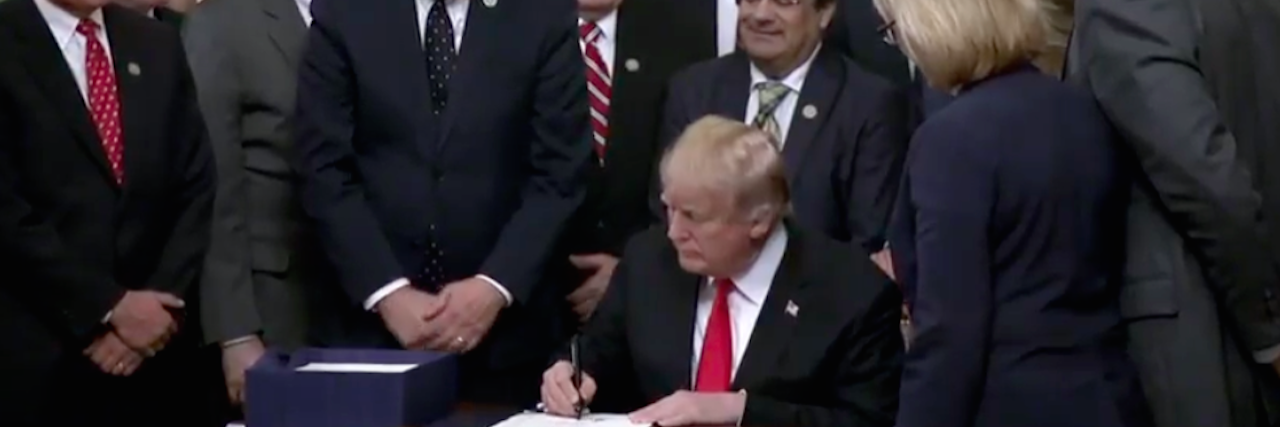New Opioid Bill Includes Policies to Discourage Opioid Use for Chronic Pain
In a ceremony at the White House Wednesday, President Trump signed a new bill aimed at fighting the opioid crisis. The bill, called the SUPPORT for Patients and Communities Act, includes a wide range of legislation that addresses addiction resources as well as policies aimed at discouraging or restricting opioid use for chronic pain and increasing information on non-opioid treatments, particularly for Medicare and Medicaid beneficiaries.
The bill overwhelmingly passed in the Senate and House of Representatives earlier this month. Some critics of the bill say it doesn’t go far enough to address opioid addiction or provide enough funding. Some chronic pain advocates worry that it will make it harder for people using opioids responsibly to access the medication that works for them.
Several new policies seek to provide more information about the “risks” of opioids to Medicare enrollees. The initial examination for new Medicare enrollees must include an opioid-use disorder screening and prescription history review. In addition, Medicare and Medicare Advantage (MA) prescription drug plan sponsors must disclose information to enrollees about the risks of prolonged opioid use each year, as well as information about coverage of nonpharmacological therapies, devices, and non-opioid medications. The Centers for Medicare and Medicaid Services (CMS) must also provide beneficiaries with information about opioid use and pain management, as well as information about covered non-opioid pain management treatments.
In addition, state Medicaid programs must have “safety edits” in place for opioid refills and in cases when opioids are prescribed along with other drugs, potentially limiting a patient’s access to opioids if their prescription exceeds the state guidelines.
Studies have shown between less than 1 percent and 12 percent of people who use opioids become addicted, and in 2016, more deaths were caused by fentanyl than prescribed medication. People who misuse opioids often use other drugs in combination with opioids and face mental health challenges, and most commonly get pills from friends or relatives, not doctors.
The bill also targets healthcare professionals, with policies aimed at identifying “outlier prescribers” (compared to other prescribers in their specialty and geographic area), notifying them of their status and supporting efforts to “curb” their prescribing behavior.
In regards to opioid prescribing in hospitals, the bill supports efforts to provide “alternative pain-management protocols” and treatments that limit the use and prescription of opioids in the emergency room. CMS must also ensure that there are no Medicare payment incentives for using opioids instead of non-opioid alternatives in outpatient procedures.
The bill also addresses pharmacists: The Department of Health and Human Services (HHS) must develop training programs and materials regarding circumstances under which a pharmacist may refuse to fill a controlled substance prescription they suspect is fraudulent, forged, or indicative of abuse or diversion.
The Food and Drug Administration (FDA) may also require certain drug packaging and disposal techniques to limit the risk of abuse or misuse.
Other policies address addiction treatment specifically, aiming to make it easier for people struggling with opioid addiction to access and pay for treatment and for healthcare providers to prescribe medications for opioid addiction, and increasing tracking of international shipments of controlled substances and illicit fentanyl. The bill also asks the secretary of HHS to convene a panel to provide recommendations on best practices for pain management, gaps in research on pain and research on acute and chronic pain. You can read a breakdown of the entire bill here.
In his remarks at the bill’s signing, Trump highlighted past efforts of his administration to combat the opioid crisis, including drug disposal and take-back programs, cracking down on overprescribing doctors and the flow of illicit fentanyl into the country and an ad campaign depicting the “dangers” of opioid use.
“We get people to stop before they ever start,” Trump said of the ad campaign. “Maybe that should be the name of the campaign, stop before they ever start.”
The ceremony ended by highlighting more than a dozen companies, including Walgreens, Google and Johnson & Johnson for their efforts providing resources towards combating the epidemic.
“Together we will defeat this epidemic, it’s a true epidemic, as one people, one family and one magnificent nation under God,” Trump said.

